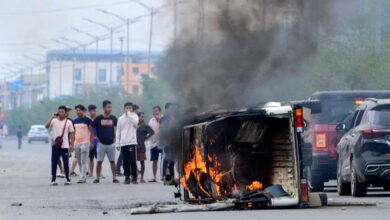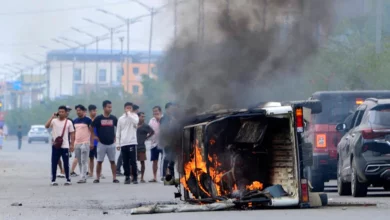The new law regulating electoral constituencies soon to be announced by Egypt's military rulers – in which electoral constituencies are larger with higher populations – will favor Islamist parties, in particular the Muslim Brotherhood's Freedom and Justice Party, say experts.
Experts say that Islamist parties, who can draw on greater financial resources, are likely to be able to launch bigger electoral campaigns both nationally and locally, outcompeting secular parties with more limited resources. Furthermore, many secular parties with less money behind them will not be able to effectively engage with the larger constituencies described in the new electoral maps, giving the better-known Islamist parties an advantage.
In addition, having larger constituencies will lead candidates and parties to spend more money on campaigning, while larger and heterogeneous constituencies are likely to witness greater rivalry and therefore more violence at the polls.
On Sunday, Al-Masry Al-Youm exclusively revealed the new electoral constituencies for the upcoming parliamentary elections, which are slated for November. According to the new law, the number of constituencies has decreased significantly from 222 to 126 for the single-winner system, with 58 constituencies reserved for the list-based system, at least doubling the geographical space and the number of voters for each constituency compared with previous elections.
A new electoral environment
The coming parliamentary election, the first since the ousting of the former president Hosni Mubarak, is a both a pivotal challenge and an opportunity for the creation of a democratic Egypt.
The elections will be conducted in a completely different political environment from that provided by the Mubarak regime, providing an opportunity for both secular and Islamist parties seeking to shape the new Egypt.
“The first main characteristic in these elections is that there is no dominant political force that has a special relationship with the state bureaucracy. This was the case with the dissolved National Democratic Party (NDP), which some voters chose because it had this link with the state,” said Hasan Abu Taleb of the Al-Ahram Center for Political and Strategic Studies.
“As for the second characteristic, it indicates the absences of the security and the secret police in administrating the electoral process. The police were hit badly during the revolution and they currently don’t have the ability to dictate whether a particular candidate will win a seat or not, as they did in the past,” said Abu Taleb.
The law on electoral constituencies follows an earlier law, issued by the Supreme Council of the Armed Forces (SCAF) in July, regulating the electoral system for parliament, in which 50 percent of seats in the lower house of parliament, the People’s Assembly, would be awarded through the list-based system, while the other half will be allocated according to the single-winner system.
The announcement worried secular political parties, which allege that the new system will enable the more organized groups such as the Freedom and Justice Party, as well as the remnants of the former regime, to control the next parliament, which will be responsible for drafting the nation’s constitution.
Members of the former NDP will have the right to run in the elections, either through the candidate-based system or through their affiliation in a newly formed party. Eight political parties have been established that are led by former members of the NDP.
Abdel Fatah Omar, an influential member of the former NDP member told Al-Masry Al-Youm that he will run for the elections representing The Egyptian Citizen Party, while Abdel Raheem al-Ghould, another influential former NDP member, said that he will run as an individual.
Serving the Islamist agenda
Experts believe that the Brotherhood – established in 1928 and formally dissolved as an NGO by a court ruling in 1954 – has built a huge empire of businesses in real estate, medical supplies and even cars.
The Brotherhood is also financially strengthened by donations from tycoons who sympathize with the group's Islamic agenda.
According to Mohammed Abu al-Ela, a leading figure in the Nasserist Party, the new constituencies map will only serve the Brotherhood because its huge financial resources will allow it to reach the larger constituencies.
Since the toppling of Mubarak, the political debate in Egypt has increasingly centered around the question of identity, whereby Islamists have managed to employ their structures to persuade large segments of society that the Islamic identity is endangered because of Egypt’s secularists.
In March, Islamist forces managed to secure a landslide victory in a constitutional referendum after falsely portraying the vote as a vote on keeping Article 2 of the constitution, which stipulates that principles of Islamic Sharia are the main source of legislation.
Such political contestation will have its impact on the electoral process.
“Many voters in larger electoral constituencies will choose to support candidates of the Muslim Brotherhood and Salafis. Don’t forget that we have voters who are not interested in political programs. Their main focus is only the idea represented by the candidate even if the electorates don’t know him,” argued Abu Taleb.
However, the Brotherhood itself has raised concerns over the size of the new constituencies.
“Candidates should travel around a constituency as if they are campaigning for the presidency,” Azab Moustafa, a member of the Freedom and Justice Party's high committee, told Al-Masry Al-Youm. “This means that the candidate will not have the time or the ability to tour the whole constituency to tell people about his program."
Prospects of violence
Traditionally, elections in Egypt have witnessed various levels of violence. Eight lives were lost in the 2000 elections, at least 12 people killed in the 2005 poll, and at least nine people died in the 2010 poll.
Experts say that the single-winner system has traditionally encouraged violence across Egypt at election time. Candidates in Cairo and the more urbanized areas used to hire thugs to perform unlawful acts such as preventing voters for the opposing candidate from reaching a polling station. In Upper Egypt, elections often became tribal and familial endeavors, with rivals using violence against opponents in order to secure victory.
Political activists believe that the enlargement of constituencies will encourage more violence.
“Having a wider constituency means that the constituency is not homogenous. Firstly, a homogenous constituency, given the tribal affiliations and the nature of the economy, is unlikely to witness violence, whereas heterogeneous constituencies the use of violence is standard,” said Abu Taleb.
Having a small constituency means that people know each other better and have common interests, a fact that has tended to limit the use of violence in the previous elections, according to Hussein Abdel Razek, secretary general of the leftist Tagammu Party.
“Families know each other better and they have common interests, so they would think twice before adopting violence. But now in a wider constituency, where more families are present and they don’t have anything common, using violence will be more obvious,” said Abdel Razek.
Currently, Egypt faces a state of social panic due to the weak presence of security forces on the streets. Despite not having official figures indicating whether or not crime is on the rise, daily newspapers are full of stories about acts of thuggery across the country.
In recent months, a traffic accident that caused no fatalities or serious damage sparked huge tribal clashes in the Upper Egyptian town of Gerga, in the Sohag Governorate, claiming the lives of five people and injuring scores more.
Local experts allege that the clashes are partly linked to widening electoral disputes concerning the constituencies.
“The election-related violence has started already with Gerga. It also was seen in terms of symbolic violence in which people destroy or tear down the banners of rival candidates. We are in the beginning, and people should take the issue of violence more seriously from now on,” said Abu Taleb.
The role of money
Political parties have traditionally raised concerns over the lack of effective legal provisions limiting financial expenditure on election campaigns. One of the most serious accusations in the 2010 elections was that the lack of enforcement of the theoretical ceiling on spending permitted widespread vote buying.
“The current system is a tool to solve such problems. Voters number tens of thousands and are distributed over larger geographical areas, which indicates that levels of vote buying will not be the same,” said Hala Mustafa, editor-in-chief of Democracy Magazine.
However, merging three constituencies into one, as is the case with the new law, means that conducting any electoral campaign within the bounds of the law will be much more expensive than previously.
“The new law supports those who have money," said Abu Taleb. "That’s the main conclusion. Before, a candidate would spend some money to hire a limited number of the youths in the constituency. The candidate depended on face-to-face interactions with the electorate. Now the story is different; candidates must be involved in establishing a developmental project, such as a health clinic or paving a road, and such activities cost money.”
In the 2010 elections, the state’s Higher Electoral Commission set that the maximum level of financial expenditure on electoral campaigns at LE200,000 (around US$35,000). However, critics say that there was no effective tool by which to observe campaign expenditure, which in some cases ran to millions of pounds.
“Practically speaking, the previous amount [LE200,000] is not enough now. You don’t have a candidate in one constituency. You have as a party to file 58 lists all over the country, and this means that you need to spend huge amounts of money to tell the whole nation about your program,” said Mustafa.
Traditional secular parties, such as the leftist Tagammu Party and the nationalist Nasserist Party have systematically complained that they don’t have enough financial resources to run their campaigns.
According to Abdel Razek, the law regulating the elections poses a severe challenge for those political parties that don’t depend on tycoons and billionaires for their funding.
“As a political party, the law issued by SCAF forces me to file 252 candidates in 58 constituencies," said said Abdel Razek. "The party should pay LE2000 in fees for each candidate. This means that a party should pay half a million pounds even before the start of the electoral campaign itself.”
Such facts mean that political parties that have huge financial resources, such as the Freedom and Justice Party, are the main beneficiaries of the system.
“Obviously, the Muslim Brotherhood has a strong position over other parties in terms of having huge financial resources. The [liberal] Wafd Party comes in second position,” said Abu Taleb.
Moreover, as Abu Taleb points out, electorates in many cases do not vote for the Brotherhood because of their programs. “They are voting for the idea expressed by the Brotherhood,” he said.




